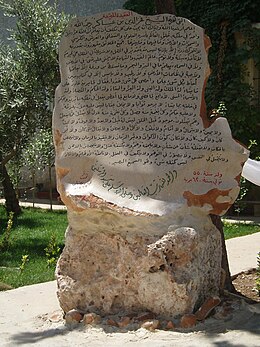Abu Ishaq al-Isfarayini
Abu Ishaq al-Isfara'ini | |
|---|---|
| Personal | |
| Born | AH 337 (948/949) Muhaddith, Scholar |
| Muslim leader | |
Influenced by
| |
| Part of a series on |
| Ash'arism |
|---|
 |
| Background |
Abu Ishaq al-Isfara'ini was a renowned
Biography
Birth and Education
Abu Ishaq al-Isfarayini was born in
Career
Al-Isfara'ini then chose to leave Baghdad and return to his native town of Isfarayin despite the esteem and favour shown to him by the scholars of Iraq.[7] Later he accepted an invitation to Nishapur, where a school was built for him.[1] From 411 AH he held sessions teaching hadith in the congregational mosque of Nishapur.[8]
Students
Abu Ishaq specialized in Shafi'i law, legal theory, hadith and theology and would pass his extensive knowledge onto many of his students. His most famous students became world renowned of their time:[5][4][9][6][10]
- Abu al-Tayyib al-Tabari
- Al-Mawardi
- Al-Lalaka'i
- Al-Bayhaqi
- Al-Qushayri
- Abu Mansur al-Baghdadi
- Abu Ishaq al-Shirazi
- Al-Khatib al-Baghdadi
Death
Al-Isfara'ini died in the Islamic month of Muharram in 418 AH (February 1027 CE), and was buried in Isfarayin. His tomb continued to attract pious visitors in the 6th/12th century.[8]
Reception
Influence
Almost none of Abu Ishaq's books have survived and
However, despite none of Abu Ishaq's books being preserved, his scholarly opinions were extremely valued and pop up frequently in later Shafi'i works on legal theory and major scholars like Abu Ishaq al-Shirazi and Ibn al-Salah recognized the significance of Abu Ishaq's role in formulating the Shafi'i/Ash'ari position on issues like abrogation and consensus. Later Shafi'i legal theorists such as Imam al-Haramayn al-Juwayni and Al-Ghazali have preserved Abu Ishaq's position on the issue of the epistemological yield of hadiths and the effect of consensus.[5]
See also
References
- ^ ISBN 9004078193.
- ISBN 978-0199945412.
- ISBN 978-9004243101.
- ^ ISBN 079144645X.
- ^ ISBN 978-9004158399.
- ^ a b Ayub, Zulfiqar (2 May 2015). THE BIOGRAPHIES OF THE ELITE LIVES OF THE SCHOLARS, IMAMS & HADITH MASTERS Biographies of The Imams & Scholars. Zulfiqar Ayub Publications. p. 172.
- ISBN 079144645X.
- ^ ISBN 9004078193.
- ISBN 978-90-04-23424-6.
- ISBN 9780748689576.
- ISBN 9786237378228.
